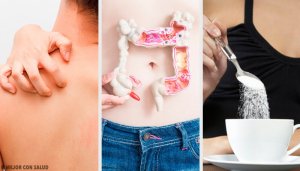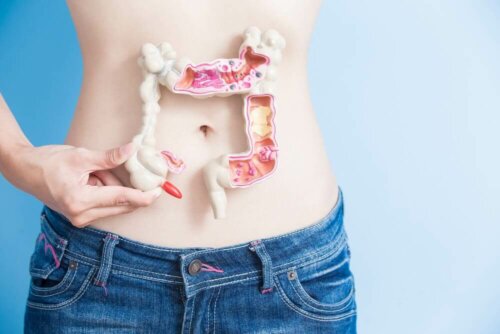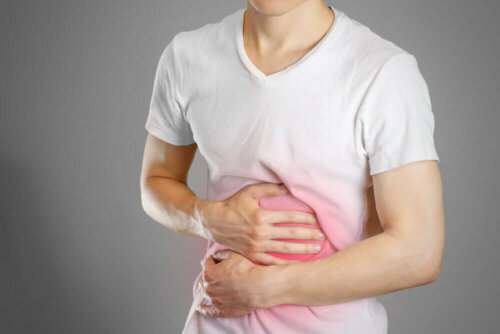Six Common Symptoms of Intestinal Problems

Today’s article will discuss some of the common symptoms of intestinal problems. First of all, you probably already know the intestines are a visceral organ in the upper part of the abdomen. Its location is between the stomach and the rectum and forms part of the digestive system which in turn divides into two sections.
The two parts of the intestines are the large intestine and the small intestine. Although they make up the same organ, and perform similar functions, these functions are very specific to each one.
The purpose of this organ is to process food, starting with the small intestines where the majority of this happens; nutrients are absorbed by the epithelial cells, which in turn distribute them to the bloodstream to carry them to the other parts of the body.
This process ends with the large intestines, which absorbs mineral salts and water to create fecal matter, which is then expelled from the body.
The intestines are as important as they’re fragile
Intestinal problems are more common than you might think and they are associated with digestive problems; the easiest way to detect this is by working out where the pain is.
Pain in the abdomen, stomach pains, and swelling are the main indicators. However, there are other, less common, signs, which can be a giveaway for illness or intestinal problems.
Like this article? You may also like to read: Cure Intestinal Infections with Three Natural Remedies

Symptoms of intestinal problems
These may help you realize something’s wrong with your intestine so you can consult a doctor as soon as possible.
Keep in mind that the information presented here doesn’t replace a medical diagnosis. Thus, consult a professional as soon as possible if you suspect you might have a condition and follow their instructions.
Sugar cravings
The bacterial groups residing in the intestine suffer various imbalances after the consumption of sweets and other sugary substances. In fact, a 2008 study published in the Annual Review of Nutrition reports on these alternative intestinal absorption pathways.
The problem with this is you won’t be satisfied even if you honor the craving, in fact, they get more intense as time goes by.
The relationship between sugar consumption and anxiety is still under investigation but we know it’s possible to develop an addiction to sweets, especially processed. At least according to this study published in Current Opinion in Clinical Nutrition and Metabolic Care.
Unlimited sugar intake can lead to various health problems, overweight is one of the best known. This could manifest with other problems that could, in turn, lead to cardiovascular disease and diabetes, as per a study published in Critical Reviews in Clinical Laboratory Sciences.
We think you may also like to read this article: Eliminate Intestinal Parasites with Garlic and Pumpkin Seeds
Psychological problems

It is normal to feel “butterflies” and other reactions in the stomach when experiencing anxiety, nerves, and other emotions. Indeed, studies like the one published in Progress in Neuro-psychopharmacology & Biological Psychiatry reveal the gut-brain relationship is bidirectional.
Thus, psychological problems such as depression, stress, and anxiety may be signs of a gut deficiency. This is due, in part, to the action of serotonin.
This hormone is a neurotransmitter responsible for producing peace, quiet, and happiness in the human body. Actually, the intestine and the brain produce this chemical, as per a study published in Frontiers in Neuroscience. For this reason, the state of mind can be a warning sign of how the organ is doing.
Excessive glucose
One of the main functions of the intestines is to process food, which of course includes sugar; if there is a problem with this function. Excessive glucose if one of the main problems linked to this problem; also known as high blood sugar, the basis for illnesses like diabetes. Furthermore, metabolic processes can be disrupted and the energy conversion cycle fails.
Skin problems could be due to intestinal problems
Acne and other types of eczema may be a sign of a gut imbalance. In fact, a study published in Gut Pathogens suggests that intestinal problems may alter the function of the epidermal barrier. However, we still don’t know how this relationship occurs and how important is the interference of intestinal health in the appearance of acne.
Despite this, the research cited above states there is “sufficient evidence” to link a skin condition to an intestinal problem. Thus, certain conditions such as acne, psoriasis, rosacea, and other skin irritations may be related to it.
Digestive instability

Problems with digestion are possibly the first sign that something isn’t right with your intestines. However, this could be caused by a problem with any part of the digestive system. It may begin with trapped gas, abdominal swelling, or diarrhea; owing to the alteration of the bacteria which protect this organ.
The imbalance in gut microbiota is due to the agglomeration of harmful substances, which deter the nutritional absorption of food. Furthermore, this can lead to irritable bowel syndrome, according to an article published in Acta Médica Peruana.
Halitosis
Stomach function can be disrupted by a bacterial imbalance when linked to digestive impairment in the gut. A study published in the Journal of Natural Science, Biology, and Medicine found that gastrointestinal problems can also lead to halitosis.
Intestinal problems concern the entire body
As you can see, it’s clear that the health of the intestine and of the entire digestive system, in general, concerns the well-being of the entire body. Thus, it’s important to adopt healthier habits and follow a well-balanced diet.
Finally, medical diagnosis is essential in any of the situations above. So, consult a doctor if you experience any of the symptoms of intestinal problems listed above.
All cited sources were thoroughly reviewed by our team to ensure their quality, reliability, currency, and validity. The bibliography of this article was considered reliable and of academic or scientific accuracy.
- Sugar Absorption in the Intestine: The Role of GLUT2
George L. Kellett, Edith Brot-Laroche, Oliver J. Mace, Armelle Leturque
Annual Review of Nutrition 2008 28:1, 35-54 - APA Ahmed, Serge H.a,b; Guillem, Karinea,b; Vandaele, Younaa,b Sugar addiction, Current Opinion in Clinical Nutrition and Metabolic Care: July 2013 – Volume 16 – Issue 4 – p 434-439
doi: 10.1097/MCO.0b013e328361c8b8 - Stanhope KL. Sugar consumption, metabolic disease and obesity: The state of the controversy. Crit Rev Clin Lab Sci. 2016;53(1):52‐67. doi:10.3109/10408363.2015.1084990
- Maes M. Depression is an inflammatory disease, but cell-mediated immune
activation is the key component of depression. Prog Neuropsychopharmacol Biol
Psychiatry. 2011 Apr 29;35(3):664-75. doi: 10.1016/j.pnpbp.2010.06.014. Epub 2010
Jun 20. Review. PubMed PMID: 20599581. - Bornstein J. C. (2012). Serotonin in the gut: what does it do?. Frontiers in neuroscience, 6, 16. https://doi.org/10.3389/fnins.2012.00016
- Bowe, W. P., & Logan, A. C. (2011). Acne vulgaris, probiotics and the gut-brain-skin axis – back to the future?. Gut pathogens, 3(1), 1. https://doi.org/10.1186/1757-4749-3-1
- Guzmán Calderón, Edson, Montes Teves, Pedro, & Monge Salgado, Eduardo. (2012). Probióticos, prebióticos y simbióticos en el síndrome de intestino irritable. Acta Médica Peruana, 29(2), 92-98. Recuperado en 11 de mayo de 2020, de http://www.scielo.org.pe/scielo.php?script=sci_arttext&pid=S1728-59172012000200009&lng=es&tlng=es
- Aylıkcı, B. U., & Colak, H. (2013). Halitosis: From diagnosis to management. Journal of natural science, biology, and medicine, 4(1), 14–23. https://doi.org/10.4103/0976-9668.107255
- Aylıkcı, B. U., & Colak, H. (2013). Halitosis: From diagnosis to management. Journal of natural science, biology, and medicine, 4(1), 14–23. https://doi.org/10.4103/0976-9668.107255
This text is provided for informational purposes only and does not replace consultation with a professional. If in doubt, consult your specialist.








